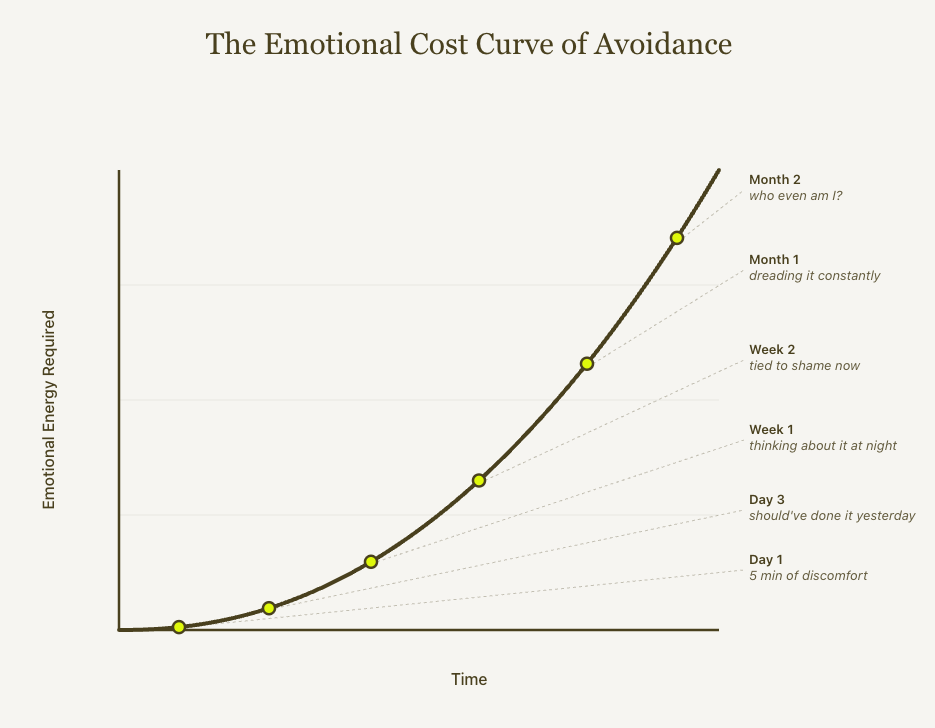A few quick housekeeping notes:
First, welcome to all my new readers. It looks like many people found their way here over the last couple of days via “the quiet thrill of not being for everyone.” Hello, and welcome!
If you’re new, you can always find a categorized archive of my posts here: glossary of thoughts
Lastly, the most recent wild bare guide: to mental self-defense is now available ICYMI
Happy reading :)
We tell ourselves we’re just putting something off. Buying time. Waiting for the right moment, the right mood, the right alignment of stars and neurochemistry. But avoidance doesn’t work like a pause button. It works like a loan, and the terms are terrible.
The thing about avoided tasks is that they don’t sit still while you ignore them. They accumulate weight. A phone call you don’t make becomes a relationship you’re neglecting. An email you don’t send becomes a pattern of unreliability. A conversation you postpone becomes a rift that calcifies. The discomfort you thought you were deferring isn’t actually being deferred at all. It’s compounding, accruing interest, growing heavier with each passing day.
This is the first and most brutal truth about avoidance: it always costs more than it saves. The emotional energy required to do something grows exponentially the longer you wait. What would have taken five minutes of mild discomfort on Tuesday becomes an hour of dread-soaked effort on Friday. By the following Tuesday, it’s not just a task anymore. It’s a referendum on your character. The math is simple but merciless. You don’t skip the pain, you just finance it, and the interest rate is punishing.
The problem is that avoidance doesn’t feel like accumulation in the moment. It feels like relief, like you’ve successfully managed something by pushing it out of your immediate field of awareness. You close the laptop, you swipe away the notification, you tell yourself you’ll handle it tomorrow when you’re more together. And for a brief moment, the nervous system quiets. Victory.
Except it’s not a victory at all. It’s a deferral, and every deferral leaves a small thread of psychic tension still attached to you, trailing behind you wherever you go. These threads don’t disappear just because you’ve stopped looking at them. They follow you into other activities, other conversations, other attempts at rest. They multiply and tangle and form a web of what psychologists call “open loops,” and open loops consume bandwidth even when you’re not consciously thinking about them.
This is why you can be watching a movie and not actually watching it, why you can be having a conversation and realize you haven’t heard a word the other person said, why you wake up tired even after sleeping eight hours. Your mind isn’t cluttered in the way we usually think about clutter—it’s collateralized. You’ve taken out loans against your attention, and the collection notices never stop coming. They arrive as background anxiety, as a vague sense of being behind, as an inexplicable irritability that colors everything you do.
The irony is that we experience this background static as evidence that we’re too overwhelmed to act. We think that we can’t possibly deal with that avoided thing right now because look how scattered we already are, look how little capacity we have. But the scattering is the thing itself—the fragmentation is the cost of avoidance, not the reason for it. You’re not too overwhelmed to handle it; you’re overwhelmed because you’re not handling it, because the unhandled thing is taking up residence in your nervous system and broadcasting distress signals that affect everything else you try to do.
Most productivity advice treats avoidance as a time management problem and offers you better calendars, smarter systems, optimized workflows. But avoidance isn’t about time, and it’s not really about organization either. It’s about emotion, about feelings you don’t want to feel and states you don’t want to inhabit.
You’re not avoiding the task itself—you’re avoiding the feeling the task brings up. The discomfort of being seen or the risk of being judged or the possibility of failure or the uncertainty of not knowing how it will go. The shame of admitting you need help or the vulnerability of trying something that actually matters to you. Most procrastination is not laziness but a nervous system protective response, an automatic mechanism designed to keep you safe from what your body perceives as psychic disruption. The problem is that your threat detection system was calibrated for physical danger, not for the emotional discomfort of sending a difficult email or having an awkward conversation. It can’t tell the difference between a lion and a performance review, so it responds to both with the same basic message: avoid, delay, protect.
This reframing matters because it changes what the solution looks like. You can’t productivity-hack your way out of an emotional regulation problem, and you can’t optimize away fear. What you can do is recognize that avoidance is not irrational and not a character flaw but your system doing what it was designed to do, which is minimize perceived threat. The fact that the threat isn’t real in any material sense doesn’t matter to a nervous system that’s just trying to keep you alive and intact.
If you want to see where avoidance is costing you, try tracking your energy footprint for a week.
So you wait. You wait for the fear to subside, for the discomfort to dissipate, for the conditions to be right. You wait until you feel ready, as if readiness were a destination you could arrive at through sufficient delay. But readiness is a mirage that shimmers on the horizon and never gets closer no matter how long you walk toward it. It doesn’t arrive before action—it arrives after, as a retrospective sensation you label only once you’re on the other side. The feeling you’re waiting for is the feeling of already having done the thing, which means waiting for it is structurally impossible.
This is the trap, and it’s an elegant one. Waiting for readiness is a fantasy created by fear, and every day you wait you reinforce the belief that the task is unbearable. You gather evidence and build a case and tell yourself a story about how hard this will be, and then you live inside that story. The story gets more elaborate and more totalizing the longer you avoid the thing itself, growing from a simple narrative about discomfort into an epic about your inadequacy and the impossibility of the task and all the ways this will go wrong.
By the time you finally act, you’re not just dealing with the original task anymore. You’re dealing with the accumulated weight of all the stories you’ve told yourself about it, all the shame of having waited, all the anxiety about whether it’s too late, all the self-recrimination about why you let it get this bad. The task itself hasn’t changed—it’s the same phone call or email or conversation it always was. You’ve just added interest in the form of narrative weight, emotional baggage, identity concerns that have nothing to do with the actual work at hand.
self-respect is free but 90% of people still won't do it
There’s a special kind of peace that comes from doing the small things before they turn into big ones. It’s quiet, sometimes invisible. You might not notice it in the moment, but you feel it the next…
And this is where avoidance starts to interfere with something deeper than productivity or efficiency. It starts to interfere with signal, with your ability to know what actually matters. The more you avoid, the harder it becomes to distinguish genuine importance from mere urgency, to tell what’s actually calling for your attention from what’s just loud. Everything starts to feel the same flavor of bad, the same level of threat. You lose calibration and begin operating in reactive mode, lurching from one fire to another, always managing crises but never choosing direction. Avoidance creates noise in your intuition and fogs the internal compass that’s supposed to help you navigate toward what matters.
Thanks for reading with me. Writing has been an integral part of my journey so if you enjoyed this post, I hope you’ll consider subscribing to help support my work—or simply hitting the like button to help boost visibility. I appreciate you so much. x








